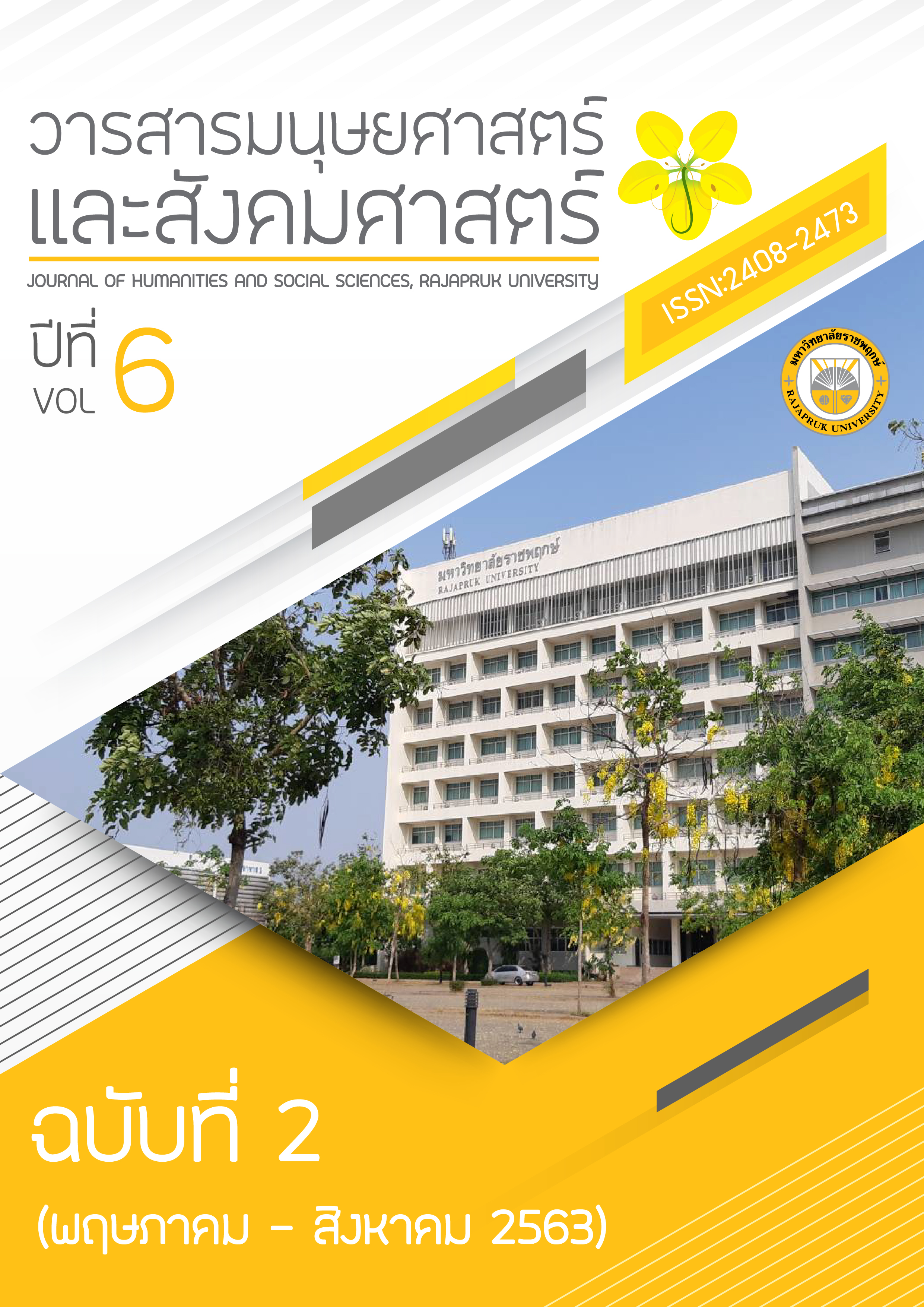The Training Course Curriculum Development of Thai Herb and Cosmetic Business for the Community Enterprise
Main Article Content
Abstract
The objective of this research were to study the needs regarding Thai herbal cosmetics business develop a Thai herbal cosmetic business training course and evaluate the Thai herbal cosmetics business training course. Conducting 3 steps of research: 1) Studying needs by surveying the basic information needs of the Thai herbal cosmetics business and in-depth interviews with 11 experts, namely, the minister who sets out the village fund policy, 1 person and 10 executives in the Thai herbal cosmetics business, 2) Assess curriculum outline and try out the curriculum outline and 3) evaluate the training course by evaluating from representatives of 30 community enterprise, 1 person for each community, a total of 30 people. Found that: 1) The demand for Thai herbal cosmetics business is knowledge about planning, budgeting, supervision and business operation basic knowledge about herbs in different regions to be used as ingredients of herbal cosmetics. Training for understanding of marketing, packaging design including channels distribution and continuously develop members in community enterprises in order to build capacity for members, 2) Curriculum development is the operation of Thai herbal cosmetics business Thai herbal cosmetics marketing and human resource management, 3) The results show that the trainers have the highest level of satisfaction. Learning scores of the trainers after training is higher than before training. After 8 weeks of training, there was more learning behavior than after training. And with more training results than after the training.
Article Details
References
กรมการแพทย์แผนไทยและการแพทย์ทางเลือก. (2559). แผนแม่บทแห่งชาติ ว่าด้วยการพัฒนาสมุนไพรไทย ฉบับที่ 1 พ.ศ. 2560-2564. นนทบุรี.
จารุพงศ์ พลเดช. (2551). การพัฒนาทรัพยากรมนุษย์. เอกสารอัดสำเนา.
จุฑามาศ ทันธิกุล และ ชลภัสสรณ์ สิทธิวรงค์ชัย. (2560). ปัจจัยที่มีผลต่อความผูกพันของพนักงานที่มีต่อองค์กรของบริษัท การ์เมนท์ จำกัด. วารสารนวัตกรรมและการจัดการ มหาวิทยาลัยราชภัฏสวนสุนันทา. ปีที่ 2 มกราคม-ธันวาคม 2560: 54-66.
ทวิชชัย อุรัจฉัท และ ชุมพล รอดแจ่ม. (2562). ความรู้และความสามารถทางวิชาชีพของนักบัญชีตามมาตรฐานระหว่างประเทศสำหรับผู้ประกอบวิชาชีพในสถานประกอบการเขตอำเภอ
บางกรวย จังหวัดนนทบุรี. วารสารมนุษยศาสตร์และสังคมศาสตร์ มหาวิทยาลัยราชพฤกษ์, 5(2) มิถุนายน – กันยายน 2562: 165-177.
เทียนทิพย์ เดียวกี่. (2561). สวทช. หนุนสร้างเครือข่ายพัฒนาสมุนไพรครบวงจร. ค้นเมื่อวันที่
8 พฤศจิกายน 2561, จาก https://www.thaihealth.or.th/Content/42869-สวทช.หนุนสร้างเครือข่ายพัฒนาสมุนไพรครบวงจร.html
ธิรดา สุขธรรม. (2557). การควบคุมคุณภาพผลิตภัณฑ์สมุนไพรไทยด้วย Chromatographic fingerprints. วารสารกรมวิทยาศาสตร์บริการ, 62(194): 10-12.
ธีรกิติ นวรัตน ณ อยุธยา. (2552). การตลาดบริการแนวคิดและกลยุทธ์. พิมพ์ครั้งที่ 3. กรุงเทพฯ: สำนักพิมพ์แห่งจุฬาลงกรณ์มหาวิทยาลัย.
ผู้จัดการออนไลน์. (2558). ทำไม? คนไทยไม่นิยมเครื่องสำอาง “สมุนไพรไทย.” ค้นเมื่อวันที่ 7 พฤศจิกายน 2561, จาก https://mgronline.com/science/detail/9580000028819.
พระราชบัญญัติเครื่องสำอาง พ.ศ. 2558. (2558). ราชกิจจานุเบกษา, 132(86ก): 5-25.
ภรภัทร จูตระกูล. (2561). กรมวิทย์ฯ ยกระดับมาตรฐานสมุนไพรไทย. ค้นเมื่อวันที่ 7 พฤศจิกายน 2561, จาก http://www.thaihealth.or.th/Content/41624-A2.html.
รัชนี เพ็ชร์ช้าง และคณะ. (2559). การบริหารจัดการธุรกิจสมุนไพร เพื่อส่งเสริมอาชีพท้องถิ่น จังหวัดอุตรดิตถ์ แบบครบวงจร. วารสารวิจัยเพื่อการพัฒนาเชิงพื้นที่, 8(1), 62-78.
วรรณพร พุทธภูมิพิทักษ์. (2556). หลักการตลาด. พิษณุโลก: สำนักพิมพ์มหาวิทยาลัยพิษณุโลก.
ศิริวรรณ เสรีรัตน์ และคณะ. (2552). การบริหารการตลาดยุคใหม่. กรุงเทพฯ: โรงพิมพ์ธรรมสาร.
สำนักงานคณะกรรมการอาหารและยา. (2559). อย. ส่งเสริมการใช้สมุนไพรในเครื่องสำอาง มั่นใจกับ “FDA Thai Herb.” ค้นเมื่อวันที่ 8 พฤศจิกายน 2561, จาก http://www.fda. moph.go.th/ Herb.pdf.
สำนักงานส่งเสริมวิสาหกิจขนาดกลางและขนาดย่อม. (2557). การจัดทำเนื้อหาองค์ความรู้ SMEs ภายใต้งานพัฒนาศูนย์ข้อมูล SMEs Knowledge Center ปี 2556. กรุงเทพมหานคร.
Blanchard, P. N., & Thacker, J. W. (2007). Effective training: Systems, strategies, and practices. 3rd ed. Upper Saddle River, New Jersey: Pearson Prentice Hall.
Boone, L. E., & Kurtz, D. L. (2004). Contemporary marketing. 11th ed. Mason, Ohio: Thomson South-Western.
Chanchal, D., & Swarnlata, S. (2008). Novel approaches in herbal cosmetics. Journal of Cosmetic Dermatology, 7: 89-95.
Kirkpatrick, D. L. (1998). Evaluating training programs: The four levels. 2nd ed. San Francisco: Berrett-Koehler.
Kotler, P. (2003). Marketing management. 11th ed. Upper Saddle River, New Jersey: Prentice Hall.
Kotler, P., & Armstrong, G. (1999). Principles of marketing. 8th ed. Upper Saddle River, New Jersey: Prentice Hall.
Kotler, P., & Keller, K. L. (2012). Marketing management. 14th ed. Upper Saddle River, New Jersey: Prentice Hall.
Nolker, H., & Schoenfeldt, E. (1980). Vocational training: Teaching, curriculum, planning. Grafenau Bavaria, Germany: Expert Verlag.
Saylor, J. G., Alexander, W. M., & Lewis, A. J. (1981). Curriculum planning for better teaching and learning. 4th ed. New York: Holt, Rinehart and Winston.


